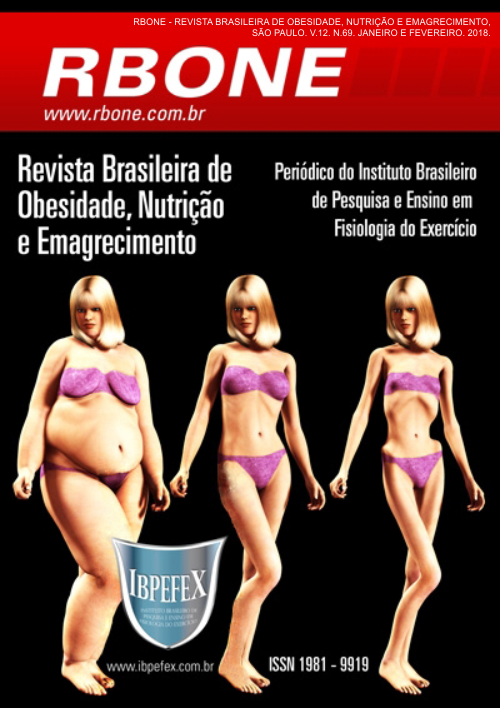Prevalence and determinants of exclusive breastfeeding and use of infantile formulas in children from 0 to 6 months in the town of Itapejara D'Oeste-PR
Abstract
Breastfeeding brings improvements in the digestive process and nervous system, favors the mother-child bond facilitating emotional development, favors immunity, maintains normal growth and development of the child. Infant formulas are indicated only when breastfeeding is impossible, its composition reaches a large part of the nutrients that make up human milk, but its composition does not match the physiological properties of breast milk. This study aimed to verify the prevalence of exclusive breastfeeding and its determinants, as well as the use of infant formulas in the first six months of life. To collect data, a questionnaire was administered to the children's parents, containing questions about the consumption of breast milk, other types of milk and other foods, including water, teas and other liquids, during the last 24 hours. (N = 22), about 40% (n = 20) of the children received infant formula, the study also emphasizes that on average 48 % (N = 24) of the mothers started the introduction of early food.
References
-Abdalia, M. A. P. Aleitamento Materno como programa de ação de saúde preventiva no Programa de Saúde da Família. Universidade Federal de Minas Gerais. Faculdade de Medicina. Núcleo de Educação em Saúde Coletiva. Uberaba, 2011. 57f. Monografia (especialização em Saúde da Família).
-Gonçalvez, R. M.; Melo, C. S. Aleitamento materno versus aleitamento artificial. Pontifícia Universidade Católica de Goiás (PUC).Goiânia. 2014.
-Gonçalves, S. A.; e colaboradores. Dor mamilar durante a amamentação: ação analgésica do laser de baixa intensidade. Revista Dor. Vol. 10. Num. 2. p. 125-129. 2009.
-Mendonça, J. S. C. Início da introdução de açúcar na dieta e presença de cárie dentária em bebês com e sem fissura labiopalatina. Tese de Doutorado. Universidade de São Paulo, 2015.
-Monte, C. M. G.; Giugliani, E. R.J. Recomendações para alimentação complementar da criança em aleitamento materno. J Pediatr. Vol. 80. Num. 5. p. 131-141.2004.
-Muniz, M. D. Benefícios do aleitamento materno para a puérpera e o neonato: A atuação da equipe de saúde da família. Universidade Federal de Minas Gerais. Faculdade de medicina. Núcleo de Educação em Saúde Coletiva. Formiga, 2010.
-Nick, M. S. A importância do aleitamento materno exclusivo nos primeiros seis meses de vida para a promoção da saúde da criança. Universidade Federal de Minas Gerais. Faculdade de Medicina. Núcleo de Educação em Saúde Coletiva. Teófilo Otoni, 2011.
-Queluz, M. C.; e colaboradores. Prevalência e determinantes do aleitamento materno exclusivo no município de Serrana, São Paulo, Brasil. Revista da Escola de Enfermagem da USP. Vol. 46. Num. 3. p. 537-543. 2012.
-Sandes, A. R.; e colaboradores. Aleitamento materno: prevalência e factores condicionantes. Acta Médica Portuguesa, 2007.
-Souza, S. N. D. H.; e colaboradores. Prevalência de aleitamento materno e fatores associados no município de Londrina-PR. Acta Paulista de Enfermagem. Vol. 25. Num. 1. p. 29-35. 2012.
-Stephan, A. M. S.; Cavada, M. N.; Vilela, C. Z. Prevalência de aleitamento materno exclusivo até a idade de seis meses e características maternas associadas, em área de abrangência de unidade de Saúde da Família no município de Pelotas, estado do Rio Grande do Sul, Brasil, 2010. Epidemiologia e Serviços de Saúde. Vol. 21. Num. 3. p. 431-438. 2012.
-Viana, K. J.; e colaboradores. Peso ao nascer de crianças brasileiras menores de dois anos. Cadernos de Saúde Pública. 2013.
-Vieira, G. O.; e colaboradores. Hábitos alimentares de crianças menores de 1 ano amamentadas e não-amamentadas. J Pediatr. Vol. 80. Num. 5. p. 411-416. 2004.
-World Health Organization. Indicators for assessing infant and young child feeding practices: conclusions of a consensus meeting held 6-8 November 2007. Washington DC. 2008.
Authors who publish in this journal agree to the following terms:
- Authors retain the copyright and grant the journal the right of first publication, with work simultaneously licensed under the Creative Commons Attribution License BY-NC which allows the sharing of the work with acknowledgment of the authorship of the work and initial publication in this journal.
- Authors are authorized to enter into additional contracts separately for non-exclusive distribution of the version of the work published in this journal (eg, publishing in institutional repository or book chapter), with acknowledgment of authorship and initial publication in this journal.
- Authors are allowed and encouraged to post and distribute their work online (eg, in institutional repositories or on their personal page) at any point before or during the editorial process, as this can bring about productive change as well as increase impact and impact. citation of published work (See The Effect of Free Access).






